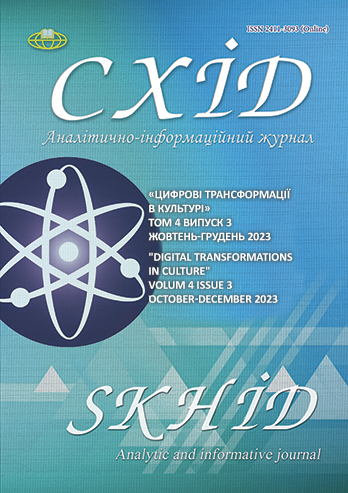Artificial intelligence capabilities in the context of the author's conception of creativity
DOI:
https://doi.org/10.21847/2411-3093.2023.4(3).294695Keywords:
artificial intelligence, background, creative AI, creativity, imagination, necessary creative activities, arbitrary creative activitiesAbstract
The study provides some philosophical reflections on the creativity of artificial in-telligence. The study supposes that artificial intelligence can be considered creative only if it creates something new with help of imagination (or its equivalent) and ap-pealing to the so-called “background” (background and general knowledge, biases, competencies, experience, habits, intuition, prejudices, political preferences, skills, stereotypes, values, and others), and its creative activity must be either necessary or arbitrary. Necessary creative activity is related to the solution of specific tasks, for example, within the framework of technical invention or scientific discovery. Arbitrary creative activity is associated with spontaneous, aimless and inexpedient human activity. This type of creative activity takes place when a creative doer has free time, leisure, enthusiasm (hobby), plays a game or is bored. Based on the two types of creative activity, two types of creative artificial intelligence can be distinguished: a weak creative artificial intelligence that makes necessary creative activities related to the tool nature of artificial intelligence, specifically to effectively solving specific problems and tasks, and a strong creative artificial intelligence that makes arbitrary creative activities, that is, creates for the sake of creating alone. The strong creative artificial intelligence can be possible only if the artificial intelligence is given autono-my, the freedom to manage that autonomy, and learns to manage its freedom.
Downloads
References
Bringsjord, S., Govindarajulu, N. S. (2018). Artificial Intel-ligence. Stanford Encyclopedia of Philosophy. Re-trieved from: https://plato.stanford.edu/entries/artificial-intelligence/ at 01.12.2023
Emsley, R. (2023). ChatGPT: these are not hallucina-tions – they’re fabrications and falsifications. Schizo-phrenia, 9 (52). https://doi.org/10.1038/s41537-023-00379-4
Glynn, P. (2023). Sony World Photography Award 2023: Winner refuses award after revealing AI creation. BBC News. Retrieved from: https://www.bbc.com/news/entertainment-arts-65296763 at 01.12.2023
Immerwahr, D. (2023). Your Lying Eyes: People now use A.I. to generate fake videos indistinguishable from real ones. How much does it matter?. The New Yorker, 54–59.
Liao, S., Gendler, T. (2019). Imagination. Stanford Ency-clopedia of Philosophy. Retrieved from: https://plato.stanford.edu/entries/imagination/ at 01.12.2023
Metz, C. (2023). Chatbots May ‘Hallucinate’ More Often Than Many Realize. New York Times. Retrieved from: https://www.nytimes.com/2023/11/06/technology/chatbots-hallucination-rates.html at 01.12.2023
Paul, E. S., Stokes, D. (2023). Creativity. Stanford Ency-clopedia of Philosophy. Retrieved from: https://plato.stanford.edu/entries/creativity/ at 01.12.2023
Rayhert, K. (2018). The philosophical issues of the idea of conscious machines. Skhid, 6(152), 108–111. https://doi.org/10.21847/1728-9343.2017.6(152).122367
Romera-Paredes, B., et al. (2023) Mathematical discov-eries from program search with large language models. Nature. https://doi.org/10.1038/s41586-023-06924-6.
The Economist. (2022, 11 June). Huge “foundation models” are turbo-charging AI progress. Retrieved from: https://www.economist.com/interactive/briefing/2022/06/11/huge-foundation-models-are-turbo-charging-ai-progress at 01.12.2023
Verma, P. (2023). AI can draw hands now. That’s bad news for deep-fakes. The Washington Post. Re-trieved from: https://www.washingtonpost.com/technology/2023/03/26/ai-generated-hands-midjourney/ at 01.12.2023
Wang, H. et al. (2023). Scientific discovery in the age of artificial intelligence. Nature, 620, 47–60. https://doi.org/10.1038/s41586-023-06221-2
What’s the next word in large language models? (2023) Nature Machine Intelligence, 5, 331–332. https://doi.org/10.1038/s42256-023-00655-z
Downloads
Published
How to Cite
Issue
Section
License
Copyright (c) 2023 Костянтин Райхерт

This work is licensed under a Creative Commons Attribution-NonCommercial-NoDerivatives 4.0 International License.
1. Authors bear responsibility for the accuracy of facts, quotations, numbers and names used.
2. Manuscripts are not sent back.
3. The publisher does not always agree with the authors' opinion.
4. The authors reserve the right to authorship of the work and pass the first publication right of this work to the journal under the terms of a Creative Commons Attribution-NonCommercial-NoDerivatives 4.0 International License. This license allows others to distribute (copy) the published work for non-commercial purposes, provided there is mandatory attribution to its authors and a link to the first publication in our journal.
5. The authors have the right to conclude separate supplement agreements that relate to non-exclusive work distribution in the form in which it has been published by the journal (for example, to upload the work to the online storage of the journal or publish it as part of a monograph), provided that the reference to the first publication of the work in this journal is included.

